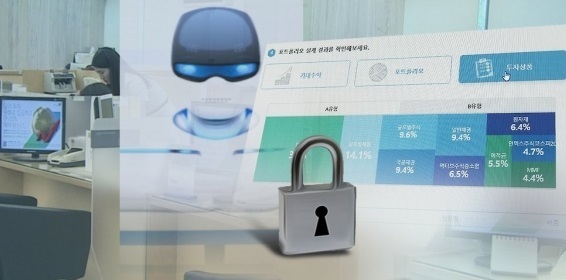 |
(Yonhap) |
Robo-adviser startups in South Korea saw their funds increase by more than 1 trillion won ($896.7 million) in a year, driven by stock trading fever amid the prolonged COVID-19 pandemic, industry data showed Sunday.
According to data from the Korea Financial Investment Association, the amount of funds entrusted to the country’s four major robo-adviser firms -- Fount, Aim, December & Company and Doomoolmori -- stood at 1.29 trillion won in the third quarter, up some 1.03 trillion won on-year from 256.2 billion won last year.
By company, Fount was found to have recorded the largest volume of management funds with 807 billion won, followed by Aim (315 billion won), Doomoolmori (148 billion won) and December & Company (23 billion won), data showed.
The total number of the surveyed robo-investing operators’ clients soared from 9,900 to 66,897 in the given period, with Aim posting the highest figure -- 28,941, up 24,000 from the previous year. December & Company was next with 14,191, followed by Fount with 12,529 and Doomoolmori with 11,236.
Robo-advisers refer to wealth management services that use automated trading algorithms to manage and optimize investment portfolios, instead of human instinct.
Robo-investing has gained popularity among both large- and small-scale investors due to its affordable prices compared with the asset advisory services of private bankers, as well as easy-to-use mobile applications that enable small-scale investors to invest in stocks or funds, officials said.
The recent buying spree in the stock market triggered by the COVID-19 market crash has further pushed investors to robo-advisers, they added.
The balance of margin accounts, or loans from brokerage houses for stock investment, topped 14 trillion won for the first time in July, KOFIA said.
The nation’s automated investment advisory market is expected to get a boost from the ongoing cross-industry movements among robo adviser startups and conventional stock companies.
December & Company, for instance, recently signed a partnership deal with KB Securities and online game developer NC Soft -- the largest shareholder of the robo-investing firm -- to establish an AI-based brokerage firm in the market.
Also, traditional financial institutions, including local lenders and securities firms, have set up their own digital algorithm-based services. All four major commercial banks here -- Shinhan, Woori, KB Kookmin and Hana -- had implemented their own AI-based wealth management programs in recent years.
By Choi Jae-hee (
cjh@heraldcorp.com)







![[Today’s K-pop] Blackpink’s Jennie, Lisa invited to Coachella as solo acts](http://res.heraldm.com/phpwas/restmb_idxmake.php?idx=644&simg=/content/image/2024/11/21/20241121050099_0.jpg)
